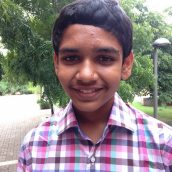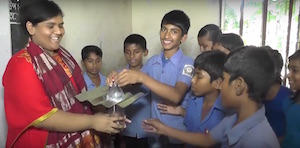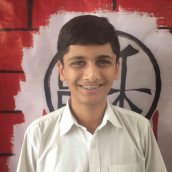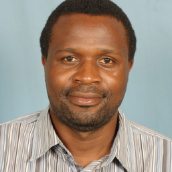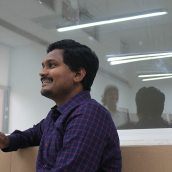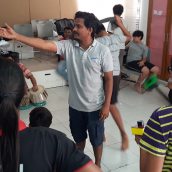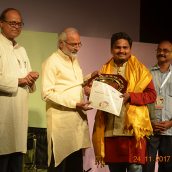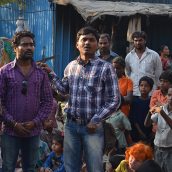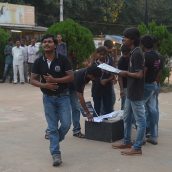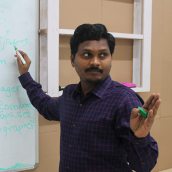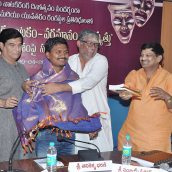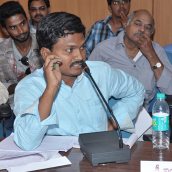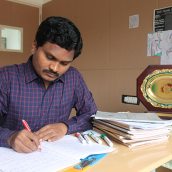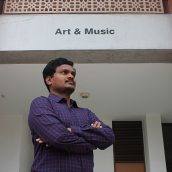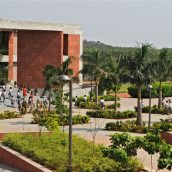Samantha Caras: Pioneering new approaches to University Counselling
Samantha Caras is from Southern California in the United States and has worked as a University Counsellor at the Aga Khan Academy Mombasa for four years. Her budding journey first began in India where she worked as an Academy Fellow for a year at the Aga Khan Academy Hyderabad supporting the leadership curriculum, helping out with college essay writing and teaching yoga before embarking on her role as a University Counsellor.
During her five years with the Academies, Samantha said her work changed the trajectory of her professional and personal life.
“It showed me that small opportunities, like being sent to a conference can change the course of your life,” Samantha said.
After being mentored in AKA Hyderabad, Samantha set out on a whirlwind experience at AKA Mombasa as a full-time University Counsellor.
“Coming to Mombasa has been exciting because I was able to have a lot of ownership over my work and could structure the office however I wanted,” Samantha said. “The flexibility and creative license I was given allowed me to build and restructure the university counselling programme to fit the diverse needs of our students.” She also said she enjoyed being immersed in many cultures, owing to the diversity of the school, and making friends from all over the world has helped her gain an overseas family for life.
Samantha said what she will miss the most is working closely with the students on their essays, being a part of High-achieving, Low-income (HALI) Access Network (an association of non-profit organisations in Africa that work with high-achieving, low-income students to access international higher education opportunities) and living in beautiful Mombasa. She also said she’s learnt quite a lot professionally, especially about the role of culture and background in higher-education advising.
During her time and position at the Academy, Samantha achieved quite a lot. On a personal level, she managed to finish her Master of Education in International Counselling Psychology, after which she got Minal Shah, the head of student support and well-being, to help her out with a professional internship. For the University Counselling office, Samantha managed to change the structure of the programme to include weekly lessons on topics such as writing a resume; professional communication; writing college essays; mock admissions game; applying for financial aid and scholarships; money matters; budgeting and cost of living abroad; adjusting to life after the Academy; and developed the presentations for these lessons. She also applied for the Academy to become a member of the HALI Access Network, which has increased its visibility and given it access to numerous resources and scholarship opportunities for the Talent Identification programme students over the past four years. Additionally, she contributed to the early drafts of what is now the University Counselling Handbook for the Academies network, set up the office’s social media page on Facebook, and worked with USA-based Ismaili volunteers to develop a sustainable standardised assessment test (SAT) programme for college admissions.
Minal describes Samantha as a warm, open and candid individual who worked well with the students.
“Samantha has built significant bonds with the students she’s worked with,” Minal said. “She always encouraged and pushed the students, who always appreciated her patience, honesty and sense of humour. I will miss working with her and her enthusiasm of making things right for the students. She will be a wonderful addition to any institution she joins.”
For her next plans, Samantha said she will be moving to Quito, Ecuador to work as the college counsellor at an international school.
“It was a difficult decision to leave Mombasa and the Academies, but I am excited for the new experience and to work on my Spanish language skills again,” Samantha said.
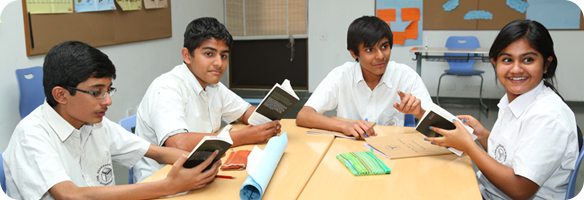
Middle Years Programme
The Senior School of the Aga Khan Academy Hyderabad is an authorised International Baccalaureate (IB) World School offering the Middle Years Programme (MYP).
We offer the IB Middle Years Programme for students in grades 6–10 as part of an integrated curriculum that includes the Primary Years Programme (grades 1–5) and the Diploma Programme (grades 11–12).
The MYP covers a study of the major disciplines, including:
- languages
- sciences
- literature
- social sciences
- mathematics
- arts
- technology
- physical education.
The five Aga Khan Curricular Strands, which are unique to the Aga Khan Academies, are integrated throughout the curriculum.
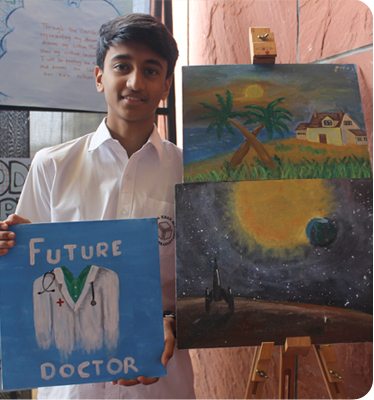 Learning through the MYP
Learning through the MYP
Our MYP students are immersed in a challenging and enriching educational environment. We ensure that they master basic skills, develop the ability to analyse and think critically, and become computer literate. We also emphasise the development of self-discipline and good work habits.
The programme encourages students to reflect on their learning and make connections with real world issues. It also helps students develop an awareness of their thought processes and learning strategies, and of how they learn best.
The MYP includes a service component that makes students aware of community and global needs. We also ensure that each student has a strong leadership experience and receives grounding in ethics, which helps prepare them for future leadership roles.
The final performance of our MYP students is assessed by teams of teachers and is validated by the IB through a monitoring process that ensures the high standards of IB schools worldwide.
MYP – grade 10 equivalence
In January 2013, the Association of Indian Universities signed an agreement with the International Baccalaureate to equate the completion of the Middle Years Programme with grade 10 of an Indian board assessment. This agreement now allows students who complete the MYP to apply for admission for higher studies to any school in India.
For further information about applying to the MYP at the Academy, please see the admission requirements or contact us.
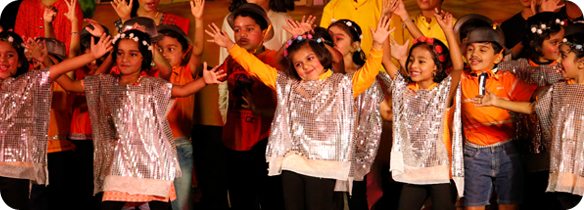
Primary Years Programme
The Junior School of the Aga Khan Academy Hyderabad is an International Baccalaureate World School and has been authorised for the Primary Years Programme (PYP).
Foundations for lifelong learning
We offer the PYP for students in grades 1–5 (aged 6–10). The programme focuses on the development of the whole child. It is geared towards creating independent, confident and respectful learners.
Our classroom curriculum addresses the children's social, physical, cultural and ethical development while giving them a strong foundation in all the major areas of knowledge.
The curriculum consists of five essential elements:
- concepts
- knowledge
- skills
- attitude
- action.
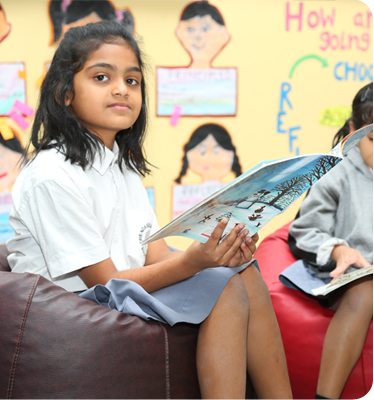 The core subjects we cover include English language, mathematics, social studies, science and technology. Our programme also includes a beginning computing course, physical education, music, art and Hindi.
The core subjects we cover include English language, mathematics, social studies, science and technology. Our programme also includes a beginning computing course, physical education, music, art and Hindi.
Students and teachers explore questions in all subject areas using an interactive, student-centred approach. The knowledge element of the curriculum is enhanced by six themes that are studied across the various subject disciplines. These are:
- who we are
- where we are in place and time
- how we express ourselves
- how the world works
- how we organise ourselves
- sharing the planet.
These transdisciplinary themes of global significance are addressed through six units of inquiry at each grade level, and this forms the school’s programme of inquiry. The programme of inquiry is the conceptual curriculum framework for the PYP. The transdisciplinary themes ensure that they are "revisited throughout the students’ years of PYP so that they are immersed in broad ranging, in-depth, articulated curriculum content” (Making the PYP Happen: A curriculum framework for international primary education).
The PYP develops well-rounded students who are well versed in all areas of knowledge. They learn to be intellectually curious, principled, caring, open-minded, well balanced and reflective learners.
Please visit the Admission Requirements page or contact us to find out more about applying to the PYP at the Academy.
Advait Surana: Academy football champion represents Telangana state
“I always wanted to play, but I never got a chance to in my previous schools. One of the reasons I joined the Academy was its sports facilities.”
Advait Surana is a residential grade 10 student at the Aga Khan Academy in Hyderabad. He was selected as one of 18 students from different schools to represent Telangana state at the national U-15 football tournament in Delhi in early September 2016. This was the first time that Telangana reached the quarter finals, where they lost to Haryana who eventually went on to win the cup.Advait, who started taking football seriously after he joined the Academy two years ago, underwent rigorous training and practice before the national tournament. He had first been observed while representing the Academy at a Rangareddy district football competition.
“My goal is to participate in the U-18 in a few years,” said Advait. “I haven’t thought about playing football professionally after that, but it is an option.”
Advait aspires to become a software engineer. As part of his International Baccalaureate grade 10 personal project (an independent and practical exploration in which students connect classroom learning engagements with their own experiences and interests), he is building a mobile app that has riddles and puzzles for all age-groups.
However, sport is always on his periphery. When asked why he thinks he was selected, he declared with confidence: “I practiced a lot, and I think I deserved it. I think I was better than the other kids.”
The Academy is incredibly proud of Advait’s achievement, as testament to our commitment to holistic education and the development of student talent across the board, in both academic and extra-curricular activities.
Nanjiba Sayara: Teaching students in Bangladesh to recycle plastic
My desire was realised through the grade 10 International Baccalaureate (IB) Middle Years Programme (MYP) personal project, a community project that focuses on service learning through practical exploration and a cycle of inquiry, action and reflection. As part of my personal project, I went to a village school in Bangladesh where I taught a group of about 20 students how to recycle plastic bottles, and the importance of such an activity. I chose to focus on this, because recycling plastic is needed to keep our environment safe and it’s a fun activity that would keep the students interested. Please click here to see a video of my experience at the village school.
I was privileged to work with those students, as they were very enthusiastic to learn and contribute. Spending one day with children from different backgrounds made me a better communicator. My parents and I have always believed that extracurricular activities are as important as academics because they contribute to being a balanced individual. I am happy to have done this activity at the village school because it made learning enjoyable and therefore memorable.
The IB MYP personal project was challenging, educational and exciting. My parents always ask me to share my happiness and knowledge with others because it might brighten up someone’s day. I believe my session at the village school accomplished this, so I wish to continue sharing my knowledge, what I have learned and will continue to learn, with my society.
Sazil Ramani – an ‘Academy advocate’ for service and social change
– Sazil Ramani, grade 10, Aga Khan Academy Hyderabad.
Sazil joined the Academy at its inception in 2011 and has since discovered many passions and predilections. “After coming here, I realized that I have a talent for photography, and am pretty good at design too. This year, I got to not only act in the annual summer productions as part of our drama class but also designed the posters and brochures. The Academy has given me many opportunities to prove myself, and I am sure this will help me in choosing a career in the future.”
His favourite subject is science, because he likes discovering new things, especially with regard to the realities of life and our surroundings. In particular, he enjoys scientific pursuits because they provide appropriate evidence to back the claims they make, and this makes it possible to persuade others towards positive social, economic and political change. Sazil aspires to be a mechanical engineer.
“As I am a residential student, I get a lot of opportunities to experience different aspects of life at the Academy,” says Sazil. “What I find most unique is the studious and peaceful environment, the greenery around us, the people from different backgrounds and cultures living with us, the facilities provided and the number of opportunities we get to prove our talents.”
Sazil’s biggest role model is His Highness the Aga Khan. “His hard work and dedication, his vision of a better world and his mission to improve the quality of life of those less fortunate. I have a similar vision and that’s why he inspires me.”
Watch a video Sazil made compiling visual anecdotes of diverse service experiences of his classmates and himself at various government school sites.
Zviko Katsande: Zimbabwean educator embodies global-mindedness
Chandrasekhar Indla - Holding the baton of Telugu theatre
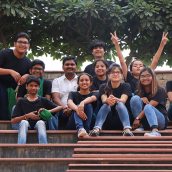 All the world's a stage, Shakespeare famously wrote, and all the men and women merely players. Chandrasekhar Indla, drama faculty at the Academy’s theatre arts department, would take a dim view of such a simplistic description of a stage play. As director, lighting designer, sound technician, mask-maker and writer, Chandra has been a part of hundreds of performances and, talking to him, you would believe that the stage is possibly more than the world, and players perhaps more than merely men and women. “Drama is an important instrument that can build a sense of consciousness in society,” he shares. “There is a need to save and reinvent drama.” For over five years now, he has dedicated his career to introducing children to the world of theatre arts.
All the world's a stage, Shakespeare famously wrote, and all the men and women merely players. Chandrasekhar Indla, drama faculty at the Academy’s theatre arts department, would take a dim view of such a simplistic description of a stage play. As director, lighting designer, sound technician, mask-maker and writer, Chandra has been a part of hundreds of performances and, talking to him, you would believe that the stage is possibly more than the world, and players perhaps more than merely men and women. “Drama is an important instrument that can build a sense of consciousness in society,” he shares. “There is a need to save and reinvent drama.” For over five years now, he has dedicated his career to introducing children to the world of theatre arts.
A prolific academic, Chandra was among highest scorers in the National Eligibility Test, an exam held nationwide by the University Grants Commission (UGC) which qualifies people to teach performing arts at a collegiate level. His work since his first tenure as a master’s student at the University of Hyderabad has been about introducing drama to a young audience. He was among the first members of the university’s Theatre Outreach Unit, created to expose children all over the state to theatre arts. He joined the Aga Khan Academy Hyderabad in 2015 to continue in this effort. “Our Academy is one of the best places where the teacher-student relationship is so strong in terms of respecting each other and sharing thoughts,” he says. Chandra, not a technical direcor for drama at the Academy, was very happy to teach at the Academy because the IB curriculum gives theatre arts the importance of a elective, rather than just tacking it on as a co-curricular activity as other school programmes do.
With two master’s degrees and a PhD on the way, Chandra surprisingly admits he wasn’t very good at school. In fact, he even struggled through his first degree, a bachelor’s in computer science. “I don’t remember any programming today,” he confides. Once Chandra relieved himself of his pursuits in technology and began honing in on theatre, his academic performance drastically improved. He finished his master’s in performing arts with a gold medal from the University of Hyderabad, and went on to earn two prestigious research fellowships from the UGC to write about theatre arts. These fellowships sustained him for nearly six years. “My family was happy to find out I was going to pursue theatre arts, because my paternal uncle is an author, and they thought he could help me.”
Chandra was born in Kanduluru in Andhra’s Prakasam district where his parents worked for daily wages, often at construction sites or in the tobacco fields of of the coastal district. “He was into old, traditional theatre arts,” Chandra says of his uncle. “Today I’m in national theatre festivals. I have more contacts than him,” he adds, laughing. Indeed, Chandrasekhar Indla has become a recognisable name in Telugu literary circles. This began when his final master’s project, a play adaptation of the book Gopathrudu by K.N.Y Pathanjali, became a sensation in theatres across Andhra Pradesh (before the creation of Telangana State). He followed this with another adapted play called Miss Meena, based on the tragicomedy The Visit by Friedrich Dürrenmatt. Ms. Meena was performed over a 100 times statewide, earning Chandra a reputation as tested thespian. Apart from this, Chandra has also spoken and presented about Telugu theatre at international conferences.
“As a professional admirer of drama I would like to hand over the future of drama to the students to take it further,” he says. Since his joining the Academy, our students have held performances across the city, attended several festivals and plays, and most notably, entered the Amaravathi National Theatre Festival in 2017. “I had the freedom to run and develop the department,” he says of being the first drama teacher at the school. “I have used this freedom to develop the students’ abilities in acting, communication, confidence, creativity and thinking skills.” With the addition of George Macpherson to the drama department as of August 2018, the programme has only gained in strength. “We’ve built a whole new teaching strategy together,” Chandra says of his friend and colleague George. “As a practioner, I'm more comfortable teaching the the practical aspects of theatre, whereas George is very good at teaching theory."
Inevitably, Chandra went from adapting literature to the stage to creating literature himself. As of date, he has been published in Telugu literary magazines 12 times, and has a collection of short stories on the way. One of the major motifs in Chandra’s writing is social equality and social reform. At the Aga Khan Academy Hyderabad, where pluralism is one of the tenets of the school’s ethos, Chandra is a person students can look up to who shows these values in his work and personal life. Chandra met his wife Ezhilmathi in 2009 when they were doing their master’s of philosophy in performing arts at Pondicherry University. His area of focus was drama while hers was music. “She taught me Tamil,” he says, “I think that’s where it began.” The two had to convince their parents before they could get married. “My marriage is inter-state, inter-faith, inter-caste,” he laughs. In August 2012, Chandrasekhar and Ezhilmathi were married in a wedding with both Hindu and Christian rituals.
“Drama can build self-confidence in a person. However, most people do not have proper understanding or admiration of drama,” Chandra says. Looking out of his office window at an overcast December morning, Chandra’s thoughts about his art turn bleak. “No one reads scripts,” he says of the culture of literature in the subcontinent. “People will just read Shakespeare as a play, but that is not the case for Telugu literature.” The shields and trophies on his desk gleam in the wintry light. “Maybe this culture of drama will die out one day."
Though the thought is dark, Chandra doesn’t let it get in the way of his work, and rather uses it to fuel his work as a teacher. He knows that many of his students will go on to pursue, say, computer science, but that doesn’t deter him. “I want my students to be good humans who are not only responsible but also sensitive to others’ emotions and culture. Drama needs to be handled more as a legacy and its nuances need to be inherited and passed on generation after generation. This is possible only when I take up the role of a teacher.”
Written by Ajay Sundaram
Welcome
Welcome to the Aga Khan Academy Hyderabad! I hope this website will capture your imagination and give you some insights into this remarkable school. We are part of a global network of schools unleashing the potential of young people! Inspired by the vision of His Highness the Aga Khan, we offer world-class education to exceptional students of all backgrounds or financial circumstance.
Our graduates are reflective, compassionate, adventurous and creative. They go on to excellent universities around the world as confident global citizens empowered to make a positive contribution in a changing world. Our curriculum is challenging, engaging and experiential – allowing students to find their strengths and develop their passions. Our state-of-the-art campus has exceptional facilities in a beautiful natural environment.
An Academy education combines the very best features of a high academic challenge with a unique approach to the enrichment and personal development of young people. We prepare our students for exams and we equip them to earn a living, and we do all of these things with rigour which nurtures the potential and achievement of each individual. Yet the education we offer is designed to go far beyond these goals; to develop the whole person and not just a part; to help each individual to become, in the words of our mission statement, "fearless learners who are culturally-rooted and internationally-minded.”
Visitors discover a friendly and dynamic atmosphere here – there is a determination to succeed, to enjoy life, to enjoy each other's company and, most importantly, to discover that there is far more in each of us than we think!
Dr Jonathan Long
Head of Academy
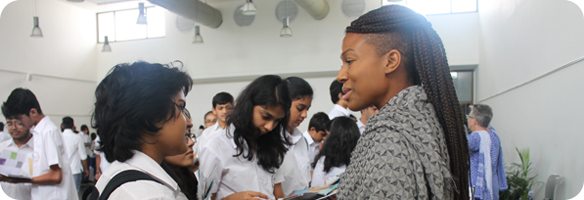
University Counselling
The Aga Khan Academy Hyderabad’s university counselling programme offers students a vast array of resources designed to help them find good matches between themselves and universities or colleges. These resources include a dynamic and well-resourced university counsellor, a wealth of printed, video and online tools, and a series of informational workshops and seminars on topics central to the university discovery process. Each year, we host university fairs at the Academy which are attended by universities from around the world, giving our students exposure to a wealth of options from which to choose.
Our counsellor engages students in individual conferences that are designed to help students reach a greater awareness of who they are. Armed with the well-articulated sense of self, students are prepared to find universities or colleges that are the best fit. Ours is a student-centred approach, and we believe that the likelihood of satisfaction with their choices is enhanced when students are empowered to 'own' the process. Also key to success is good communication among all parties: students, parents and university counsellors. While outcomes are important, it is the process of self-discovery and university-discovery on which our programme focuses.
For more information, please write to our University Counsellor, Pragati Pandey, reachable at pragati.pandey@agakhanacademies.org.
Click here to view the 2023-2024 school profile.
Click here to download a copy of the 2023-2024 University Counselling Handbook.

